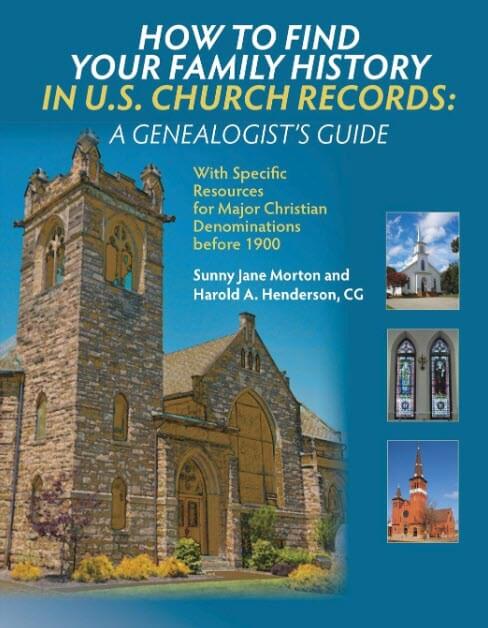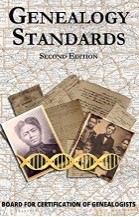Mayflower Ancestors and More in New Genealogy Records Online
Discover your Mayflower ancestors–or more about your family history from around the world–in new and updated genealogy records online. Among them are the Welsh National Book of Remembrance for WWI and various records for Indiana, Massachusetts, Montana,...Adoption of Washington State Native Americans Among New and Updated Genealogical Record Collections This Week
Adoption of Washington State Native Americans records are now available for genealogical research. Also this week you can fill up on North Carolina school books, California land dockets, Florida newspapers, Canadian Aboriginal Peoples records, Lower Canadian census for 1825, and new additions to historic British newspapers.
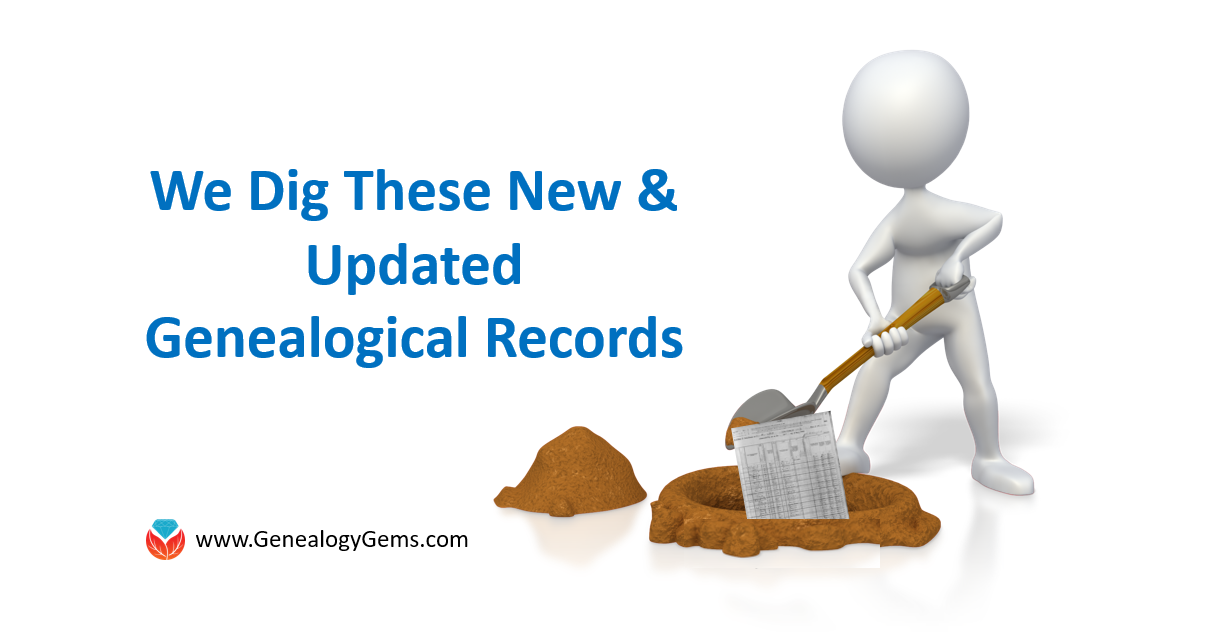
United States – Adoption of Washington State Native Americans
Washington, Applications for Enrollment and Adoption of Washington Indians, 1911-1919 is now available at FamilySearch.org. This collection consists of records created during the creation of the Roblin Rolls of Non-Reservation Indians in Western Washington. The enrollment and adoption proceedings of Indian tribes in Western Washington that were not on tribal census records makes this collection unique. It is arranged by tribal name claimed by the applicant, and then by applicant’s name.
Records may contain:
- English name of the primary individual or family members
- Indian name of the primary individual or family members
- Birth, marriage, or death dates
- Birth, marriage, or death places
- Place of residence
- Ages
- Number of children in the family
- Occupation
- Other biographical details about the family or individuals such as migrations
- Tribal affiliation
- Religious affiliation
- General information about the tribe
United States – North Carolina – School Books
North Carolina Digital Heritage Center features highlights from the collections at DigitalNC, an online library of sources from across North Carolina. This week, the archive has added almost 90 years worth of “BlueBooks” from St. Mary’s School in Raleigh. The years covered are 1911-2000.
St. Mary’s School was both a high school and a college. In particular, the Student Blue Books could be especially useful for genealogists or historians, as they document the names, activities, and some addresses of the students.
United States – California – Land Docket
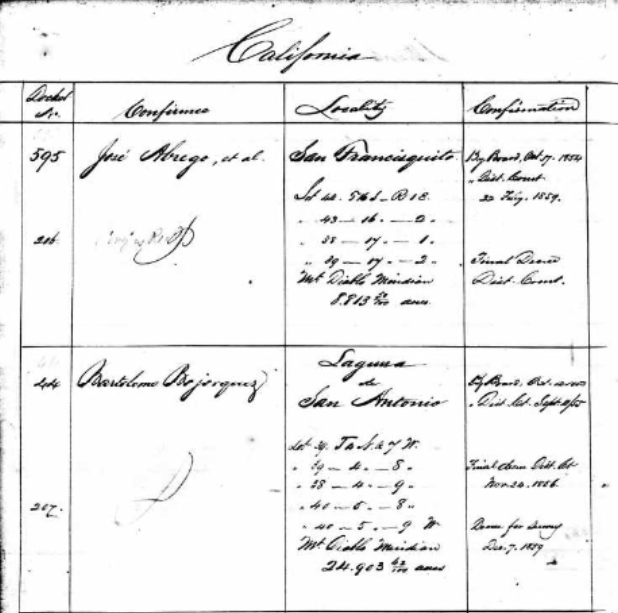
California, Private Land Claim Dockets, 1852-1858 for José Abrego at Ancestry.com
Each record in the index usually includes the name of the landowner, their docket number, and the record date.
United States – Florida – Newspapers
Do you have ancestors from Florida? Newspapers.com now has the Palm Beach Post. With a basic subscription, you can see issues of the Palm Beach Post from 1916 through 1922; or, with a Publisher Extra subscription, access earlier years and additional issues from 1922 to 2016.
Florida’s Palm Beach Post first began publishing in 1908 with the name Palm Beach County, and in 1916 (by this time called the Palm Beach Post) the paper made the switch from running weekly issues to daily.
Canada – Aboriginal Records
Library and Archives Canada added over 600 documents from the Royal Commission on Aboriginal Peoples recently. These records can be viewed at the Library and Archives Canada website.
These records include transcripts of more than 175 days of public hearings, consultations and roundtables; research studies by academics and community experts; and submissions by non-governmental organizations. Until now, patrons could only access this collection in person at LAC’s downtown Ottawa location, or by submitting a reprography request. This is a wonderful asset to the many helpful collections online for Canadian researchers.
Lower Canada – Census
The Lower Canadian Census of 1825 from Findmypast contains over 74,000 records covering modern day Labrador and southern Quebec. Each search result will provide you with an image of the original document and a transcript. Information may include the language your ancestor spoke, where they lived, and with how many people they lived. It does not name each of the inhabitants in the home by name, but they are marked by age.
1.2 million Irish immigrants arrived from 1825 to 1970 according to Wikipedia. The peak period of entry of the Irish to Canada in terms of numbers occurred between 1830 and 1850, when 624,000 arrived. Quebec was a port of entry. So, if you have Irish immigrants who you think may have come to Canada by 1825, this might be a great census for you to look at.
Britain – Newspapers
Over 1.5 million new articles have been added to the military publications available at Findmypast in their historic British Newspapers. The Naval & Military Gazette and Weekly Chronicle of the United Service are two of the new titles added. Additional articles come from the Army and Navy Gazette.
More on Native American Research Collections
This week’s records featured Adoption of Washington State Native Americans. But whether you are searching for your Native heritage in Canada, the Western United States, or the Southeastern United States, we know you want the best in education and helpful tips. We have created a three-part series regarding how to use the Native American collections on Fold3.com here:
- How to Use the Dawes Collections for Native American Research
- Eastern Cherokee Applications for Native American Research
- Guion Miller Roll for Native American Research
Disclosure: This article contains affiliate links and Genealogy Gems will be compensated if you make a purchase after clicking on these links (at no additional cost to you). Thank you for supporting Genealogy Gems!
Archdiocese of Boston and American Ancestors Expand Historic Project
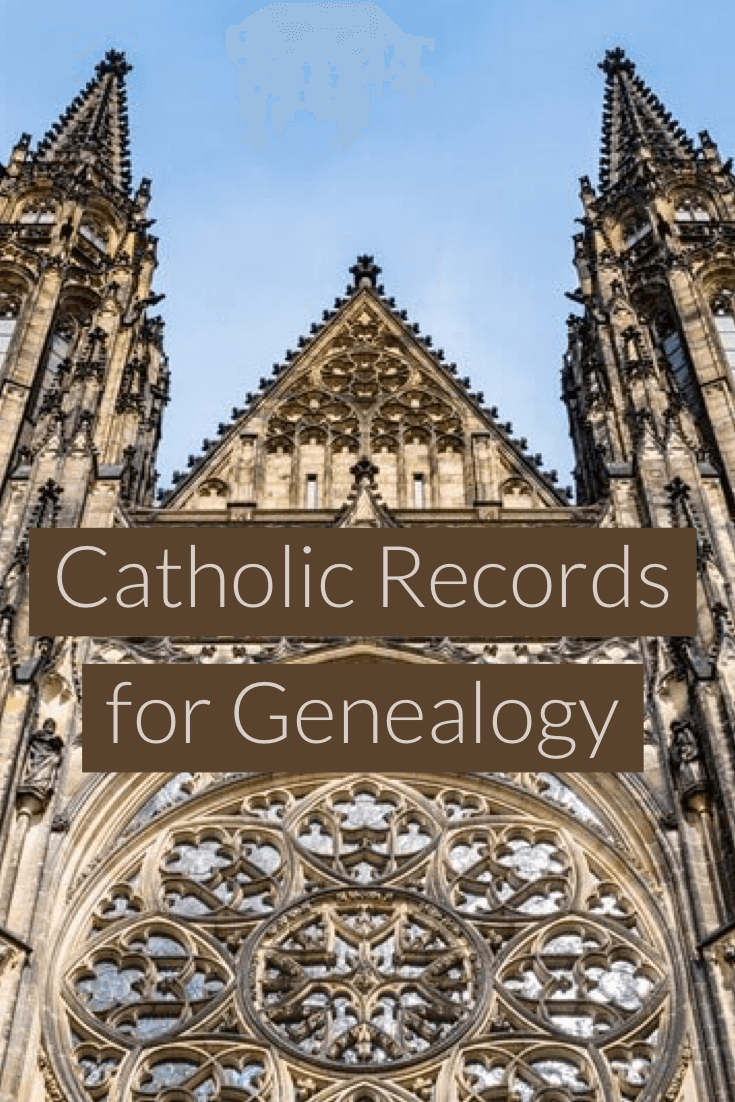
Historic Catholic Records Online Project Expansion
Announced by American Ancestors and the Archdiocese of Boston
These historic records document several sacraments of the Catholic Church in Boston and surrounding towns including baptism, confirmation, holy communion, marriage, and the anointing of the sick. They are valued for research because they contain detailed information about the Catholic parishioners of greater Boston, their relationships with each other, the church, and often the community.
When announced in January 2017, the Historic Catholic Records Online Project—the first of its type in the U.S. to digitize a significant number of sacramental records from any U.S.-based Catholic archdiocese—encompassed 154 parishes in 84 towns within the Boston Archdiocese, covering the years 1789 to 1900.
Today’s announcement extends the project’s reach to cover records through the year 1920—adding 20 additional years of sacramental records to the project and eventually bringing more than 60 new parishes within it—all formed within the Boston Archdiocese after 1900.
Catholic parishes in the towns of
- Billerica,
- Danvers,
- Dracut,
- Forest Hills,
- Groton,
- Mattapan,
- Methuen,
- North Andover,
- Saugus,
- Sharon,
- Shirley,
- Swampscott,
- Wakefield,
- Wilmington,
- and Winthrop
will now be included—covering important phases of greater Boston’s early 20th-century history and stories of immigration, social, and cultural change.
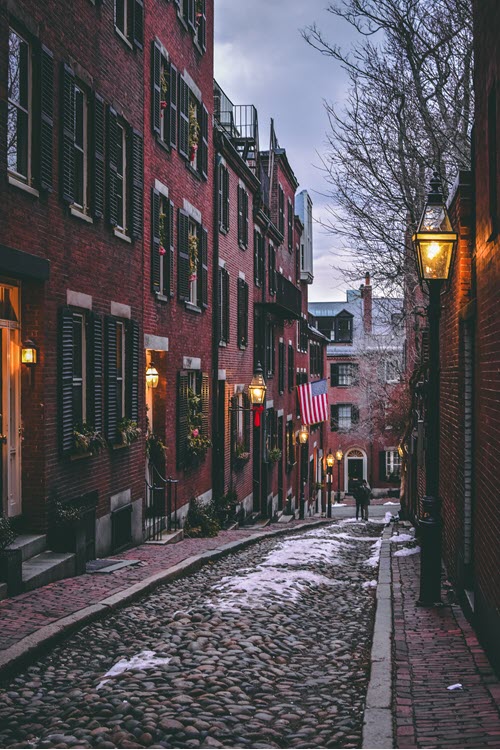
Boston
Brenton Simons, President and CEO of American Ancestors, also known as New England Historic Genealogical Society, celebrated the amplification of the project, noting “Throughout our 175-year history, New England Historic Genealogical Society has collected and shared countless manuscripts, artifacts, data, and other resources that tell the inspiring story of the American family. The expansion of this historic collaboration between the Boston Archdiocese and American Ancestors will enrich the research of family historians in America and beyond and be especially informative in Irish, Italian, and French Canadian genealogy. Newer parishes from the 1900s add Lithuanian, Polish, and Portuguese genealogical data of interest.
“I offer our deep gratitude to the Roman Catholic Archdiocese of Boston for recognizing the historical value of this data—especially Thomas Lester, the Archivist and Records Manager of the Archdiocese, whose forward-thinking vision toward preservation and collaboration inspired this important project and its expansion we are announcing today,” Simons said.
Lester, as the Boston Archdiocese’s leading advocate for records preservation, stated “We recognize the value of this collection to many groups, foremost among them historians and genealogists. This second, expanded phase of our project with American Ancestors, is a result of the overwhelming positive feedback received during the initial phase announced with them in January 2017.
“Use of the records by researchers around the world has exceeded our original expectations and we are excited to offer additional content, with more insights, and deeper glimpses into the history of the Roman Catholic people and parishes in greater Boston. Of equal importance is that we are continuing to create a digital backup to help preserve these irreplaceable records.”
“The completion of the expanded project, covering all records through the year 1920 is now anticipated to be by the year 2029,” stated Molly Rogers, Database Coordinator for American Ancestors, “with all browsable (non-indexed) and indexed names from all parish archives expected to be online by that time.”
The project is enormous in scope, with a large amount of data to be digitized and then laboriously, manually indexed, transcribed, and, in most cases, translated to English for name-searching capabilities.
Some of the first records from this expanded time period—browsable images of pages from parish archives—are available and may be viewed at AmericanAncestors.org/image-
Volunteers coordinated by the staff of American Ancestors undertake the greater portion of the work of scanning and indexing the Historic Catholic Records Online Project documents.
Resources for Using Church Records for Genealogy
Genealogy Gems Podcast Episode 232
Genealogy Gems Podcast Episode 232
with Lisa Louise Cooke
August 2019
Listen now, click player below:
Download the Show Notes PDF in the Genealogy Gems Podcast app.
Please take our quick podcast survey which will take less than 1 minute. Thank you!
In this episode:
- Exploring what you can do to go deeper in your genealogy research for a more accurate family tree with Elissa Scalise Powell
- Irish genealogy podcaster Lorna Moloney, a professional genealogist with Merriman Research, discusses Irish genealogy.
Mailbox
Marcia Finds Treasure on eBay
“I recently remembered your idea of searching for family related things on eBay.
My grandfather and his brother both worked as agents for the Wrought Iron Range Co. of St. Louis. They sold excellent quality wrought iron stoves and my great uncle did very well there as a supervisor.
I did a search for the Wrought Iron Range Co on eBay and immediately pulled up a history of the company, an advertisement for the range and a metal they gave away. I bought them all!
However, the best goodie which I am still bidding on is a “salesman’s sample Wrought Iron Range stove about 12 inches tall and 14 inches long in color and with all working parts.
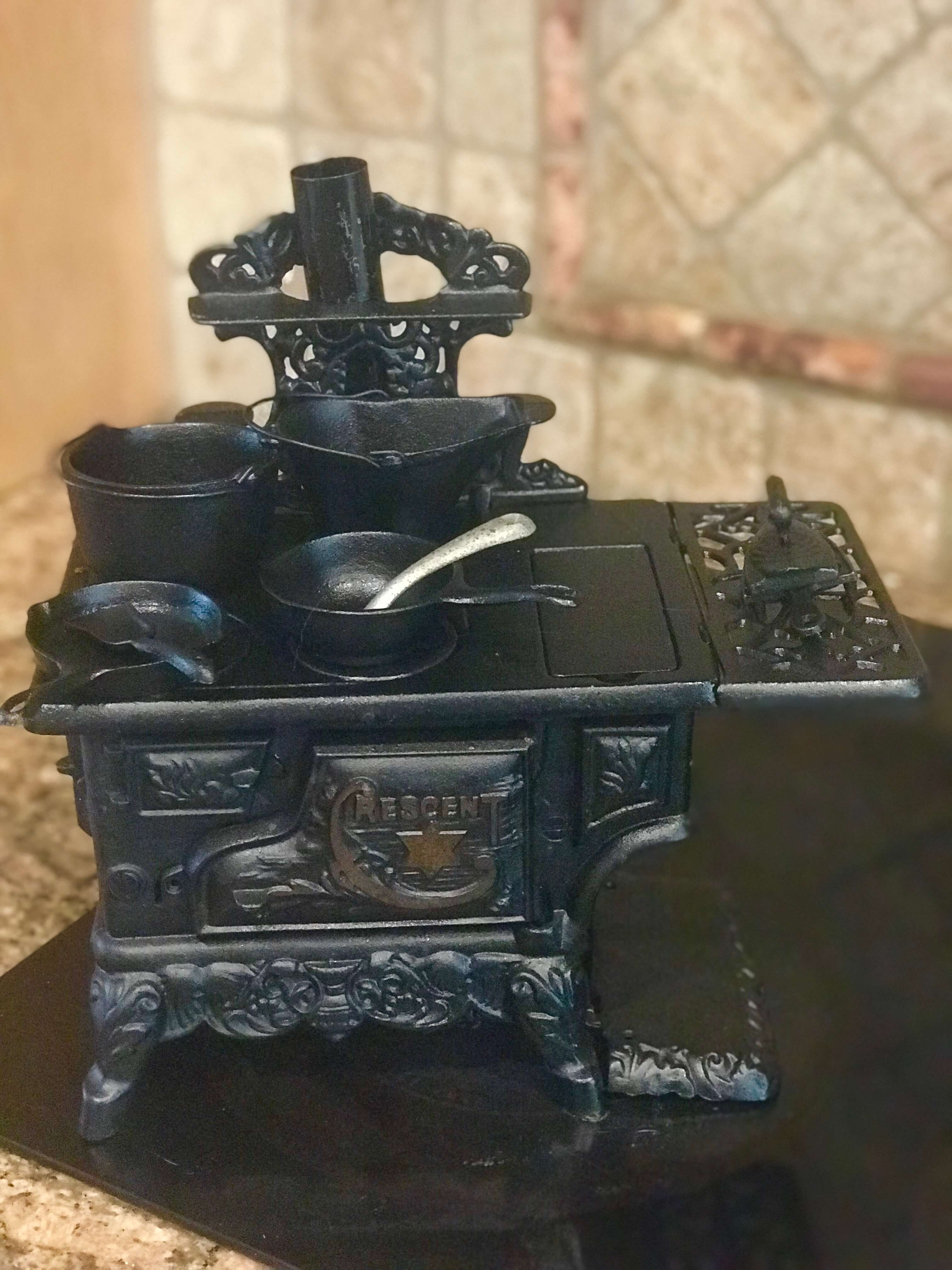 (Photo: The stove Lisa inherited from her grandmother.)
(Photo: The stove Lisa inherited from her grandmother.)
I may not win the bid, but I am thrilled with what I found.
This will bring my grandfather’s occupation to life for my great nephews!!!!”
More eBay Research Strategies on Genealogy Gems:
- Learn more about eBay alerts in Genealogy Gems Podcast Episode 140.
- Genealogy Gems Premium episode 76
- Genealogy Gems Premium episode 16
- Learn more here about Genealogy Gems Premium Membership
Steve Shares a New German Translation Resource
“I came across a new site that you might like to inform your listeners about. It is very new and just getting started, so I know they would appreciate a mention.
The name of this new site is “German Letters in Letters” [germanletters.org]. What they are doing is trying to collect letters written between German immigrants to the US and their relatives back home in Germany.
You can very easily submit scanned copies of any letters you have and the really neat thing is that they will post them at their site. Once they post them, they are asking for translations by any volunteers. So, this is an excellent way to have any letters in your possession to be translated….. for FREE!
I was given about 30 letters written to my GG grandfather, Johann Bernard Husam, who immigrated to Adams Co., Illinois about 1855.
They are from his siblings, nieces, and a nephew back in Germany. They range from 1866 to the early 1900s.
I scanned them and they are now on this site. I was given these letters by great granddaughter-in-law [my aunt] who spoke German as she had grown up in the Sudetenland area of Czechoslovakia. She had escaped Czechoslovakia at the end of WWII before the Russians invaded. She, thankfully, had translated all of the letters.”
Resource:
Learn more about German research from these articles at Genealogy Gems.
What Ann Likes About the Podcast
Hi, Lisa, I’d love to say that your podcast has helped me with a genealogy brick wall but at this point I’m only a “drop-in genealogist,” figuring that I’m the only one in the family interested at this time (working on one grandson though, because I think he’d be a real asset) in finding and preserving family stories.
I do research in fits and starts. But, I do love your podcasts. I’m catching up on back episodes now and recently listened to one that started with you describing a granddaughter’s first Christmas coming up.
It reminded me of one of the best things about your podcasts – it’s like you’re sitting in my living room with me, having a cup of tea, discussing your stories and tips and tricks to help with mine.
Thank you so much for all the information, and for your casual, personal, yet professional style!”
Kristine is No Longer a “Cooke-Cutter” Researcher
“I just retired and guess what is first on my list of things I WANT to do? 🙂 I jumped in with both feet listening to your Premium podcasts and realized a few times that I am the ‘cookie-cutter’ researcher. But, no more. You are the Captain of my ship now. Thank you!
After binging on your podcasts the last two weeks, the first bit of advice I took was changing the way I searched on Newspapers.com. My family’s everyday life’s treasures were buried in the pages of the local news! You made me take a second look after I dismissed the possibility of ever reading about them.
Thank you so much for your dedicated work on behalf of all the genealogists. My Premium subscription will NEVER run out. When a family member says “I don’t know what to get you” I’m prepared to solve that dilemma!
Warm regards,
A listener for life”
Resource:
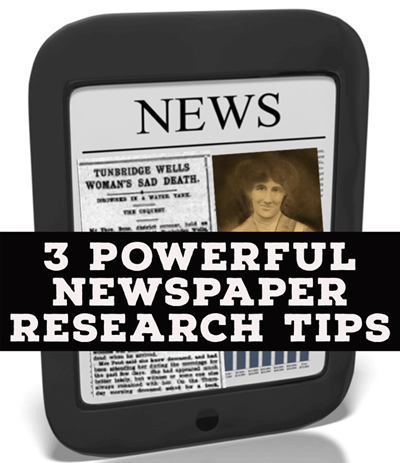 Read Lisa’s article called A Shocking Family Secret and 3 Powerful Newspaper Search Tips
Read Lisa’s article called A Shocking Family Secret and 3 Powerful Newspaper Search Tips
This podcast is sponsored by:
GEM: Overcoming Shallow Research with Elissa Scalise Powell
About today’s guest:
Elissa Scalise Powell, CG, CGL, is co-director of the Genealogical Research Institute of Pittsburgh (GRIP); past-president of the Board for Certification of Genealogists, and 2017 She won the Association of Professional Genealogists Professional Achievement Award. She is a Certified Genealogist®, and Certified Genealogical LecturerSM. You can reach Elissa at Elissa@PowellGenealogy.com. (Thank you to Elissa for contributing notes for this episode.)
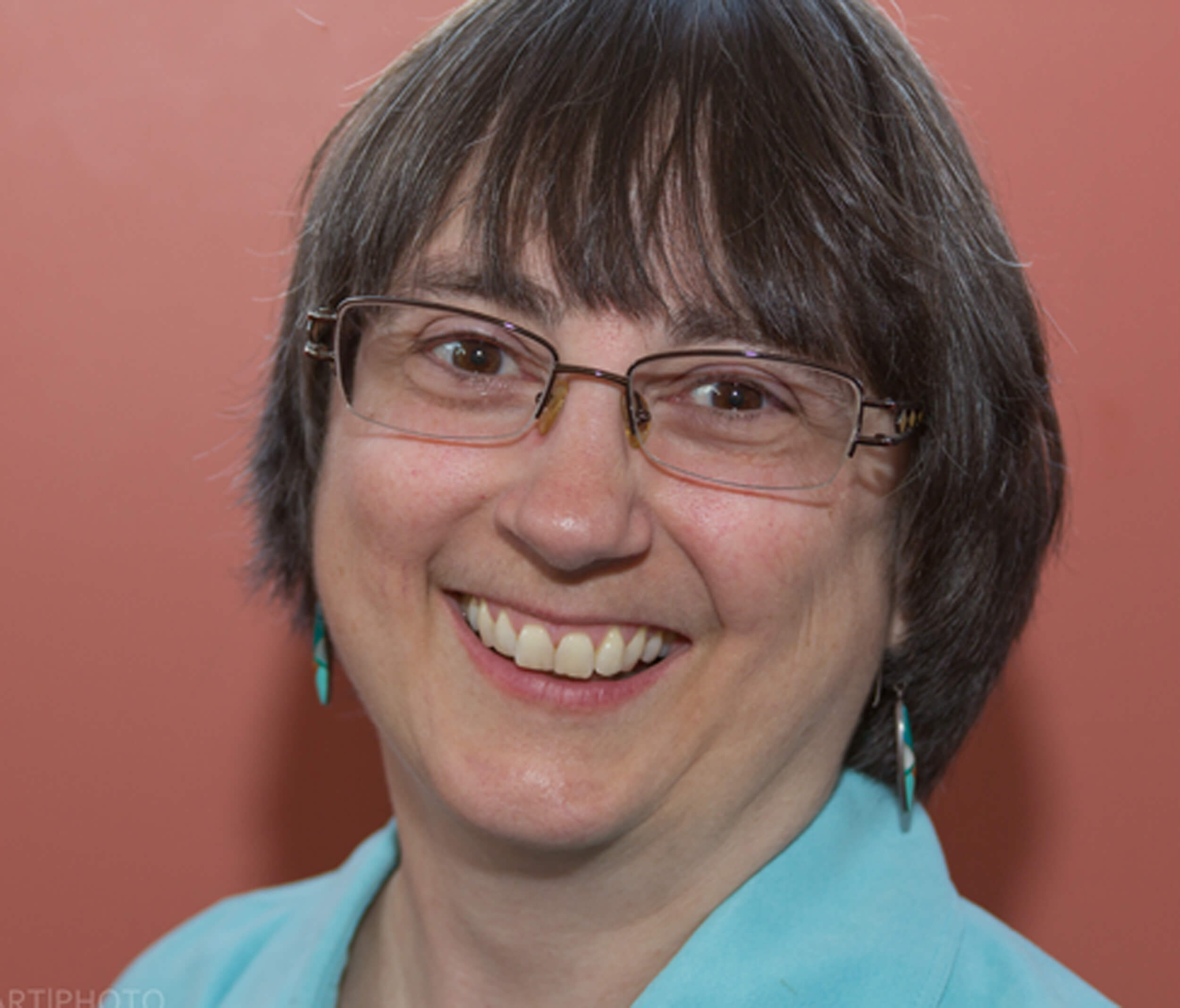
The Genealogical Proof Standard (GPS)
The Genealogical Proof Standard was created to help genealogists gain confidence in their research conclusions by providing criteria that can be followed. A genealogical conclusion is considered proved when it meets all five GPS components.
The 5 Components of the GPS
- Reasonably exhaustive research – This type of research emphasizes original records that provide the information for all evidence that might answer a genealogist’s question about an identity, relationship, event, or situation
- Complete, accurate citations to the source or sources of each information item contributing—directly, indirectly, or negatively—to answers about that identity, relationship, event, or situation
- Tests—through processes of analysis and correlation—of all sources, information items, and evidence contributing to an answer to a genealogical question or problem
- Resolution of conflicts among evidence items pertaining to the proposed answer
- A soundly reasoned, coherently written conclusion based on the strongest available evidence
Resource
The book Genealogy Standards by the Board for Certification of Genealogists provides a standard by which all genealogists can pattern their work.
About Sources
Some sources are considered “Low-hanging fruit.” They can be described as:
- straightforward research
- easily accessible
- record type is easily understood
- document states the fact desired
Many times, genealogists will need to stretch and reach for harder to find sources. These types of sources are:
- not straightforward
- possibly unknown to you at this time
- not easily accessible
- time-consuming to explore
- take study to understand it
- not self-explanatory
Elise’s Examples of the Pitfalls of Shallow Research
- Believing that family stories have been accurately passed down in all details.
- Believing that official documents are always correct.
- Believing that published records, especially transcriptions or abstracts, are faithful representations of the original.
- Premature conclusions can come back to haunt us.
- Disregarding ill-fitting evidence can create brick walls.
- Careless citation practices do not give us the tools we need for analysis.
- Researching and understanding historical context is crucial to solving problems.
- Barriers requiring expertise beyond our own should not hamper the research process.
- Assuming there is only one record and suspending research when the first one is found.
- Assuming that details are unimportant, or not noticing them at all.
Elissa also points out that when we do shallow research, we can actually do more harm than good. Shallow genealogical research:
- Doesn’t allow our ancestors to reveal themselves or their reasons for actions
- Puts them in the wrong time and place
- Can create wrong kinship ties
- Misleads future researchers
- Causes brick walls
- Wastes our time
- Does a disservice to our current family and descendants
GEM: Irish Genealogy with Lorna Moloney of Merriman Research
While speaking at THE Genealogy Show conference in Birmingham England in June of this year I got a chance to sat down for the first time with Lorna Moloney host of The Genealogy Radio show which is produced at Raidio Corcabaiscinn. It airs live on Thursday at 4p.m. and is podcast (click here for episodes). Lorna runs Merriman Research which is dedicated to bringing educational solutions and resources to a wide audience.
Lorna’s website: www.traceyouririshroots.com
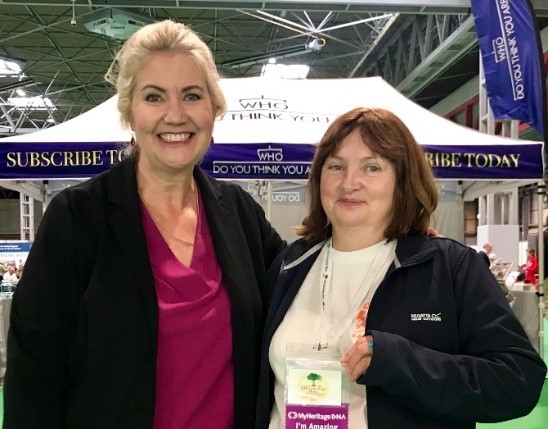
Photo: Lisa and Lorna at THE Genealogy Show in Birmingham, England in 2019.

